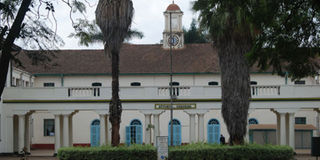Address work stoppage or students will fail final tests, warns headteachers’ lobby

PHOTO | DENISH OCHIENG A view of the deserted Jamhuri High School compound in Nairobi on July 4, 2013.
What you need to know:
- Outcome of mock exams, which are expected to begin on July 15 in different parts of the country, hangs in the balance
Headteachers have warned of a decline in performance by public school candidates in national examinations if swift action is not taken to end the teachers’ strike.
Kenya Secondary Schools Heads Association (Kessha) said preparations for the tests had been adversely affected by the strike as have other non-academic programmes such as sports and music.
Kessha vice-chairman Indimuli Kahi, who is also the Principal of Chavakali High School, on Saturday called on the government and the unions to speedily resolve the strike to avoid further loss of learning hours.
“It will take the teachers up to two weeks to bring the students back to the learning mood. The longer the strike takes, the harder it will be to do that,” he said. “The strike has eaten into the time that the students should have been engaged by the teachers in final revision for the national exams.”
The outcome of mock exams, which are expected to begin on July 15 in different parts of the country, hangs in the balance. “Schools will now be forced to have crash programmes for them to recover the time lost and complete the syllabus among other activities scheduled during the term.”
Mr Kahi said regional sports and music competitions had also been interrupted, although he cautioned against extending the term. “Wider consultations need to be done before an extension of the term is done. This is because the learners may be unwilling, and it will end up being a further waste of time forcing them to be in school during the August holiday.”
Mr Joseph Karuga, the chairman of Kenya Primary Schools Heads Association, said both teachers and learners needed “de-briefing” after the strike
“We should not assume that the day the strike is called off, the learners and teachers will all be set for back to business as usual,” he said in a telephone interview from the United States where he is attending a cultural conference in Ohio.
“More often than not, these strikes are having negative impacts on members of the school community and it is therefore important for a de-briefing session (to be held.)” Kenya Union of Post-Primary Education Teachers (Kuppet) has called off its job boycott, but its members have since defied the union, and pressed on with the strike alongside their Knut counterparts.
Kuppet chairman Omboko Milemba asked members to obey the call for return to work as they were acting on directives of the Industrial Court issued last Monday. “It is in obedience of the court orders that we suspended the strike to allow for negotiations. If the government does not meet our demands, then we will call the members back to the streets.”




